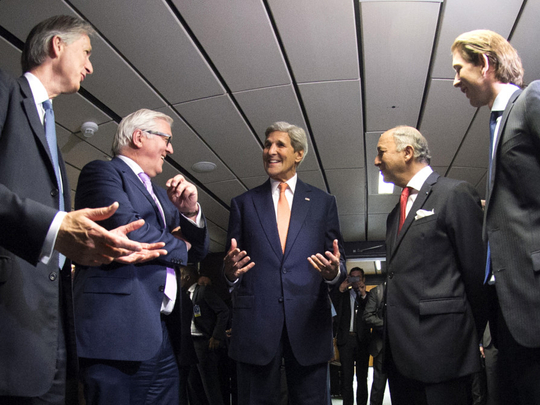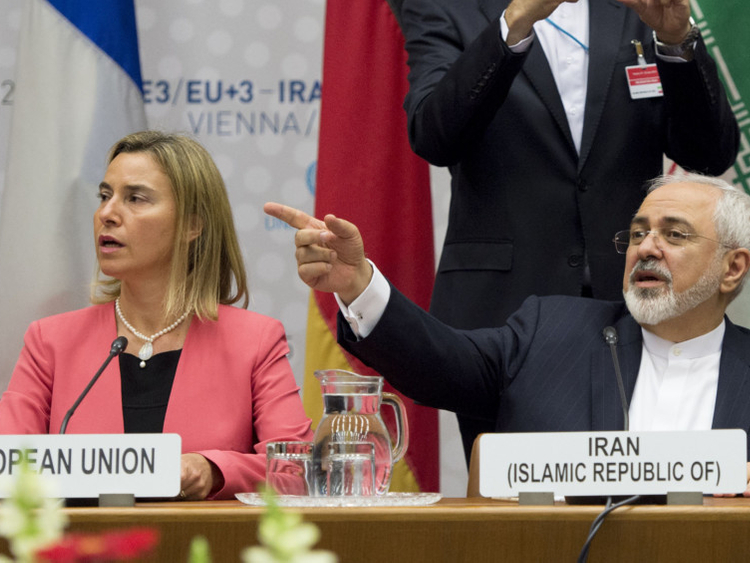
Dubai: US President Barack Obama heralded a historic nuclear agreement with Iran on Tuesday as an opportunity for the longtime foes to move in a “new direction,” while sharply warning Congress that it would be irresponsible to block the accord.
“No deal means a greater chance of more war in the Middle East,” Obama said in early morning remarks from the White House.
Obama, accompanied by Vice-President Joe Biden, spoke shortly after negotiators in Vienna announced the landmark deal aimed at curbing Iran’s nuclear programme for more than a decade in exchange for billions of dollars in international sanctions relief. The president said the agreement, hammered out through nearly two years of negotiations, would cut off all of Iran’s pathways to a bomb and give the international community unprecedented access to the country’s nuclear facilities.
“This deal is not built on trust,” Obama said. “It is built on verification.”
The president renewed his vow to veto any such legislation and urged lawmakers to consider the repercussions of their actions. He painted a grim scenario in which the rest of the world struck its own nuclear deals with Iran, leaving the US isolated. And without the limitations and verifications included in the deal announced on Tuesday, Obama said he or a future US president would be more likely to face a decision about using US military action to prevent Iran from building a bomb.
Grumblings from Congress Republicans started soon after Obama’s address.
US Republican House Speaker John Boehner criticised the deal, saying Obama had “abandoned his own goals.”
The Republican chairman of the US House of Representatives Foreign Affairs Committee said it does not require Tehran to dismantle bomb-making technology and will allow it to develop an industrialised nuclear programme in ten years.
“The deal they have struck is looking like a tough sell,” US Representative Ed Royce, who will convene a hearing on the deal on Tuesday morning, said in a statement.
The deal starts a new phase of intense negotiation — this time between the Obama administration and the US Congress, where some Republicans have long been working to sink an agreement.
Any effort in Congress to overturn the deal would face an uphill fight. Republicans have majorities in both the House of Representatives and Senate, but they would need the support of dozens of President Barack Obama’s fellow Democrats to sustain a “resolution of disapproval” that could cripple a deal.
The chances of that happening are slim. A resolution of disapproval would need only the support of the Republican majority to pass the House, but would require the votes of at least six Democrats to get the 60 to advance in the Senate. The chances of mustering enough votes to then overrule a near-certain Obama veto are slimmer still.
The second-ranking Democrat in the House, Steny Hoyer, said after the deal was announced: “It is now up to members of Congress to work carefully through every detail, particularly given Iran’s likelihood to exploit any ambiguity or loophole to its benefit and to the detriment of the security of America, Israel, and our allies in Europe and the Gulf.”
Senate Democrats have stood firm to date against Republican-led efforts to interfere with the talks, which included Iran and the United States, Britain, China, France, Germany and Russia.
In the House, more than 150 Democrats, including party leader Nancy Pelosi, signed a letter in May strongly supporting the nuclear negotiations.
“I understand the heavy lift that’s involved,” Tennessee Republican Senator Bob Corker, chairman of the Senate Foreign Relations Committee, told reporters when asked about the chances of passing a “resolution of disapproval.”
‘Major turning point’
Obama in May signed a law, written by Corker, giving Congress the right to review the agreement and potentially sink it by passing a disapproval resolution that would eliminate the president’s ability to waive sanctions passed by Congress.
Easing sanctions is an integral part of the deal, under which Iran will curtail its nuclear program.
Under the Iran Review Act, lawmakers have 60 days to review the agreement and decide whether to seek a resolution of disapproval. During that period, plus an additional 22 days in which Obama could veto a resolution and Congress could try to override it, Obama cannot waive the congressional sanctions.
A veto override would require a two-thirds majority in both houses — or 13 Democrats along with all 54 Republicans in the Senate, and 43 Democrats plus as all 236 House Republicans.
Party leaders have said there is no guarantee that every Republican would back a disapproval resolution.
Sanctions passed by Congress account for the overwhelming majority of those imposed by the United States. US sanctions are especially important to the international sanctions regime because of the country’s influence on global trade and banking.
Meanwhile, French President Francois Hollande said that major powers had to be vigilant about how Iran used any financial resources it gained from sanctions relief after a nuclear deal and urged Tehran to help find a solution to the Syrian crisis.
“Now that Iran has a greater financial capacity, we need to be extremely vigilant on what Iran will be,” Hollande said.
“Iran must show that it is ready to help us end the conflict,” he added.
Iran has been a key backer of Syrian President Bashar Al Assad, who hailed the agreement as a “great victory”. Al Assad said he was confident his top regional ally would step up its efforts to back “just causes”, suggesting he expects more backing from Tehran in his fight against insurgents after a nuclear deal.
Al Assad said in a congratulatory message to Iran’s Supreme Leader Ayatollah Ali Khamenei published by state news agency SANA.
Al Assad also called the atomic agreement sealed in Vienna a “major turning point” in the history of Iran, the region and the world.
French President Francois Hollande, however, said Iran must now show it is ready to help the international community bring the Syria conflict to an end.
— Agencies












